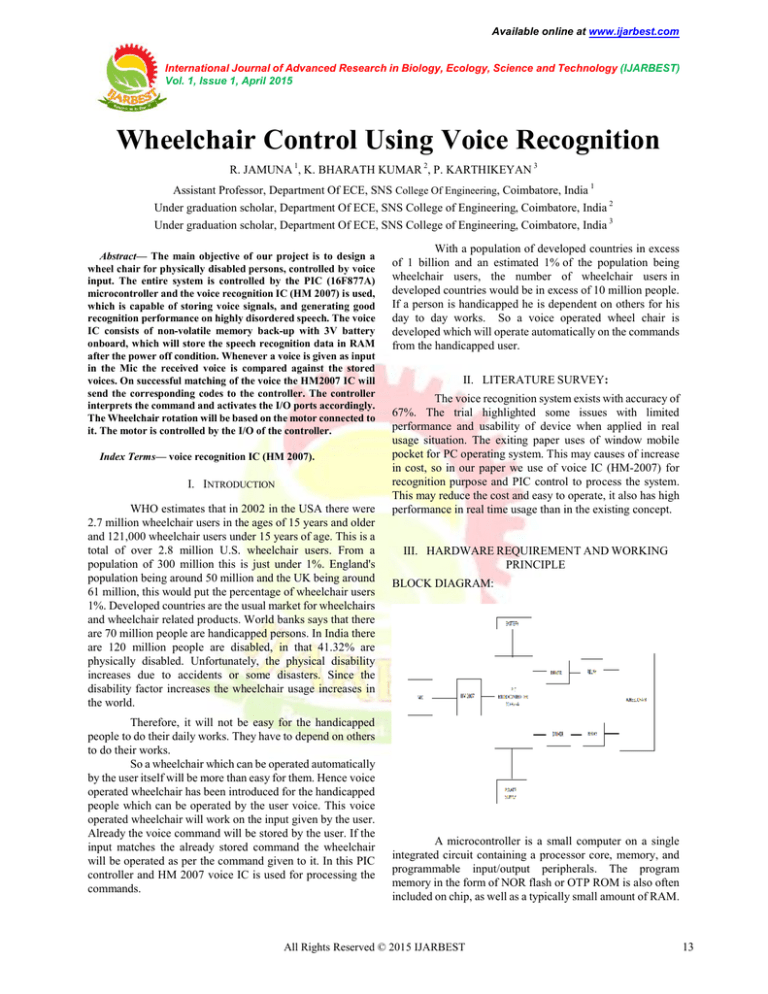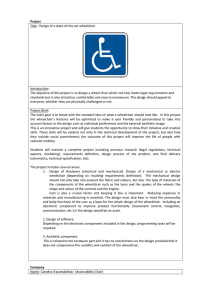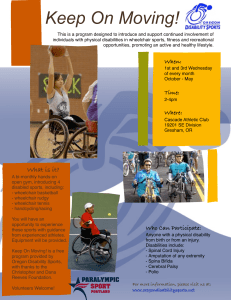
Available online at www.ijarbest.com
International Journal of Advanced Research in Biology, Ecology, Science and Technology (IJARBEST)
Vol. 1, Issue 1, April 2015
Wheelchair Control Using Voice Recognition
R. JAMUNA 1, K. BHARATH KUMAR 2, P. KARTHIKEYAN 3
Assistant Professor, Department Of ECE, SNS College Of Engineering, Coimbatore, India 1
Under graduation scholar, Department Of ECE, SNS College of Engineering, Coimbatore, India 2
Under graduation scholar, Department Of ECE, SNS College of Engineering, Coimbatore, India 3
Abstract— The main objective of our project is to design a
wheel chair for physically disabled persons, controlled by voice
input. The entire system is controlled by the PIC (16F877A)
microcontroller and the voice recognition IC (HM 2007) is used,
which is capable of storing voice signals, and generating good
recognition performance on highly disordered speech. The voice
IC consists of non-volatile memory back-up with 3V battery
onboard, which will store the speech recognition data in RAM
after the power off condition. Whenever a voice is given as input
in the Mic the received voice is compared against the stored
voices. On successful matching of the voice the HM2007 IC will
send the corresponding codes to the controller. The controller
interprets the command and activates the I/O ports accordingly.
The Wheelchair rotation will be based on the motor connected to
it. The motor is controlled by the I/O of the controller.
Index Terms— voice recognition IC (HM 2007).
I. INTRODUCTION
WHO estimates that in 2002 in the USA there were
2.7 million wheelchair users in the ages of 15 years and older
and 121,000 wheelchair users under 15 years of age. This is a
total of over 2.8 million U.S. wheelchair users. From a
population of 300 million this is just under 1%. England's
population being around 50 million and the UK being around
61 million, this would put the percentage of wheelchair users
1%. Developed countries are the usual market for wheelchairs
and wheelchair related products. World banks says that there
are 70 million people are handicapped persons. In India there
are 120 million people are disabled, in that 41.32% are
physically disabled. Unfortunately, the physical disability
increases due to accidents or some disasters. Since the
disability factor increases the wheelchair usage increases in
the world.
Therefore, it will not be easy for the handicapped
people to do their daily works. They have to depend on others
to do their works.
So a wheelchair which can be operated automatically
by the user itself will be more than easy for them. Hence voice
operated wheelchair has been introduced for the handicapped
people which can be operated by the user voice. This voice
operated wheelchair will work on the input given by the user.
Already the voice command will be stored by the user. If the
input matches the already stored command the wheelchair
will be operated as per the command given to it. In this PIC
controller and HM 2007 voice IC is used for processing the
commands.
With a population of developed countries in excess
of 1 billion and an estimated 1% of the population being
wheelchair users, the number of wheelchair users in
developed countries would be in excess of 10 million people.
If a person is handicapped he is dependent on others for his
day to day works. So a voice operated wheel chair is
developed which will operate automatically on the commands
from the handicapped user.
II. LITERATURE SURVEY:
The voice recognition system exists with accuracy of
67%. The trial highlighted some issues with limited
performance and usability of device when applied in real
usage situation. The exiting paper uses of window mobile
pocket for PC operating system. This may causes of increase
in cost, so in our paper we use of voice IC (HM-2007) for
recognition purpose and PIC control to process the system.
This may reduce the cost and easy to operate, it also has high
performance in real time usage than in the existing concept.
III. HARDWARE REQUIREMENT AND WORKING
PRINCIPLE
BLOCK DIAGRAM:
A microcontroller is a small computer on a single
integrated circuit containing a processor core, memory, and
programmable input/output peripherals. The program
memory in the form of NOR flash or OTP ROM is also often
included on chip, as well as a typically small amount of RAM.
All Rights Reserved © 2015 IJARBEST
13
Available online at www.ijarbest.com
International Journal of Advanced Research in Biology, Ecology, Science and Technology (IJARBEST)
Vol. 1, Issue 1, April 2015
Microcontrollers are designed for embedded applications, in
contrast to the microprocessors used in personal computers or
other general purpose applications.
The voice input from the subject is stored in the HM2007
voice recognition IC. Whenever a voice is given as input in
the mic the received voice is compared against the stored
voices. On successful matching of the voice the HM2007
module will send the corresponding codes to the controller.
The controller interprets the command and activates the I/O
ports accordingly. The Wheelchair control will be based on
the motor connected to it. The controller sends the electrical
pulses to the relay board, which in turn controls the motor by
switching it on or off
REQUIREMENTS:
Structure
Specification
Gesture
Voice recognition
Communication
Input as speech signal
Frequency range-2.4
Processor
PIC 16F877A
Voice IC
HM 2007
PIC CONTROLLER:
PIC 16F877 is one of the most advanced
microcontroller from Microchip. This controller is widely
used for experimental and modern applications because of its
low price, wide range of applications, high quality, and ease
of availability.
This is easy-to-program (only 35 single word
instructions) CMOS FLASH-based 8-bit microcontroller
packs Microchip's powerful PIC architecture into a 40- or
44-pin package and is upwards compatible with the
PIC16C5X, PIC12CXXX and PIC16C7X devices. The
PIC16F877A features 256 bytes of EEPROM data memory,
self-programming.
A microcontroller is a small computer on a single integrated
circuit containing a processor core, memory, and
programmable input/output peripherals. In this we use of PIC
controller, which is referred to as Peripheral Interface
Controller. PIC devices are popular with both industrial
developers and hobbyists due to their low cost, wide
availability, large user base, extensive collection of
application notes, availability of low cost, serial
programming,
and
re-programmable
Flash-memory
capability. In this system we use of 16 bit, 40 pins PIC and it
has of 5 I/O ports.
VOICE IC [HM 2007]:
The speech recognition system is a completely
assembled and easy to use programmable speech recognition
circuit. Programmable, in the sense that you train the words
you want the circuit to recognize. This board allows you to
experiment with many facets of speech recognition
technology. It has 8 bit data out which can be interfaced with
any microcontroller for further development. Some of
interfacing applications which can be made are controlling
home appliances, robotics movements, Speech Assisted
technologies, Speech to text translation, and many more.
And it is used to store the voice signal
and to recognize the input with that stored signal, if it matches
then it will sends the command or the codes to the controller,
the voice IC [HM 2007] used consists of 40 pins in it, which is
capable of recognize voice at quicker rate.
The chip provides the following error codes.
55 = word to long
66 = word to short
77 = no match
The circuit must be designed to recognize error codes 55, 66
and77 are not confuse them with word spaces 5, 6 and 7.
FEATURES:
Maximum operating frequency is 20MHz.
Flash program memory (14 bit words), 8KB.
Data memory (bytes) is 368.
EEPROM data memory (bytes) is 256.
5 input/output ports.
3 timers.
2 serial communication ports (MSSP, USART).
PSP parallel communication port
10bit A/D module (8 channels)
All Rights Reserved © 2015 IJARBEST
14
Available online at www.ijarbest.com
International Journal of Advanced Research in Biology, Ecology, Science and Technology (IJARBEST)
Vol. 1, Issue 1, April 2015
In this voice IC, we can store of different voice signals. It
can store upto 40 words in it. This voice IC has of maximum
word length 1.92 seconds. It also has of response time less
than 300 milliseconds.
Structure
SPECIFICATIONS
Specification
Input voltage
9 to 15 V DC Use a commonly
available 12V 500ma DC
Adapter
Output data
8 bits at 5V Logic Level
Interface
PIC 16F877A
Word capacity
Upto 20 words
GEAR MOTOR:
Geared DC motors can be defined as an extension of DC
motor. A geared DC Motor has a gear assembly attached to
the motor. The speed of motor is counted in terms of rotations
of the shaft per minute and is termed as RPM .The gear
assembly helps in increasing the torque and reducing the
speed. Using the correct combination of gears in a gear motor,
its speed can be reduced to any desirable figure. This concept
where gears reduce the speed of the vehicle but increase its
torque is known as gear reduction.
electrical isolation between control and controlled circuits),
or where several circuits must be controlled by one signal.
Driver operates on 12V power supply. It provides
DC current up to 4A. The operating supply voltage is up to
46V. It is a high voltage and high current dual full bridge
driver IC having 15 pin. This is used to drive the DC motors.
ADVANTAGES:
A handicapped person even with legs and hand can
use this and become independent.
Less Hardware require i.e. compact.
Economical.
Reduce manpower.
User friendly.
POWER SUPPLY AND BATTERY:
The power supply is to give supply to the circuits for
functioning. The power supply consists of a step down
transformer which reduces the voltage supply to 12v. Then,
the AC supply is rectified into DC supply using the rectifier.
Further, they are regulated at 12v/5v using voltage regulators.
A regulator circuit removes the ripples and also remains the
same dc value even if the input dc voltage varies.
RESULT:
COMMAND
Move forward
Move reverse
The motor is an electrical device which is used to
rotate or to move the objects. In this we use of Gear motor
which has of less torque and pulling capacity. And also the
power consumption of the gear motor is low. Two gear motors
has been used in order to pull the two wheels of the wheel
chair.
RELAY& DRIVER:
A relay is an electrically operated switch. Many
relays use an electromagnet to mechanically operate a switch,
but other operating principles are also used, such as
solid-state relays. Relays are used where it is necessary to
control a circuit by a low-power signal (with complete
Left
right
RESULT
Wheel chair moves forward
direction
Wheel chair moves
backward direction
Wheel chair moves left side
direction
Wheel chair moves right
side direction
IV. CONCLUSION:
This paper has described the development of portable,
voice communication is controllable by automatic speech
recognition. The voice IC is used in order to recognize the
voice efficiently and to operate the wheelchair in a significant
manner. It will help the physically disabled people to do their
All Rights Reserved © 2015 IJARBEST
15
Available online at www.ijarbest.com
International Journal of Advanced Research in Biology, Ecology, Science and Technology (IJARBEST)
Vol. 1, Issue 1, April 2015
works without depending on others. And also this voice
operated wheelchair will be more useful in hospitals and
orphanages. The device can be configured to enable the user
to create either simple or complex messages using a
combination of a relatively small set of input “words.”
Evaluation with a group of potential users showed that they
can make use of the device to produce intelligible speech
output. A person with disabled with legs and arms can use this
wheel chair efficiently if he is able to speak.
Development”, Volume 42, Number 4, Pages 423–436
July/August 2005.
V. REFERENCE:
[1]. A Voice-Input Voice-Output Communication Aid for
People with Severe Speech Impairment
Mark S. Hawley, Stuart P. Cunningham, Phil D. Green, Pam
enderby, Rebecca Palmer, siddharth sehgal, and Peter
O’Neill.
[2]. “Voice Operated Intelligent Wheelchair” by Ms. S. D.
Suryawanshi , Mr. J. S. Chitode , Ms. S. S. Pethakar, “
International Journal of Advanced Research in Computer
Science and Software Engineering” Volume 3, Issue 5, May
2013.
[3]. “Voice and Touch Screen Based Direction and Speed
Control of Wheel Chair for Physically Challenged Using
Arduino” by M.Prathyusha, K. S. Roy, Mahaboob Ali Shaik,
“ International Journal of Engineering Trends and
Technology (IJETT)” , Volume4Issue4, April 2013.
[4]. “A Wheelchair Steered through Voice Commands and
Assisted by a Reactive Fuzzy-Logic Controller” by Gabriel
Pires and Urbano Nunes “Journal of Intelligent and Robotic
Systems” 34: 301–314, 2002.
[5]. “Smart Wheelchairs: A literature Survey”, by Richard
Simpson “Journal of Rehabilitation Research &
Mrs. R. JAMUNA. Assistant Professor(SR) in the
Department of ECE at SNS College of Engineering,
Coimbatore, obtained her Bachelor’s degree in
Electronics& Communication Engineering
from
Bharathiar University in the year 1997. She obtained
her Master’s degree in VLSI Design from Anna
University Coimbatore. She has 17 years of teaching
experience. Date of birth is 17th December 1974. Her
registration for Ph.D. in 2010.
Mr. K. BARAT KUMAR, Under graduate scholar,
Department of ECE , SNS College Of Engineering,
Coimbatore is from Karur, born on 3RD April
1994.He has published the paper in National
Conference on“Trends in Automotive Parts Systems
and Applications” (TAPSA’15)
Mr. P. KARTIKEYAN, Under graduate scholar,
Department of ECE, SNS College Of Engineering,
Coimbatore is from Coimbatoresss, born on 3th
October 1993. He has published the paper in
National Conference on“Trends in Automotive Parts
Systems and Applications” (TAPSA’15)
e
All Rights Reserved © 2015 IJARBEST
16




